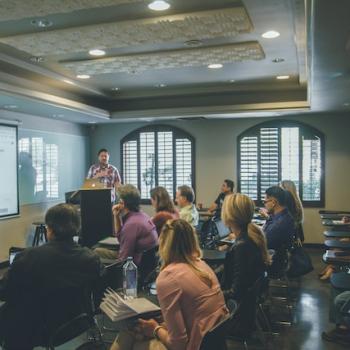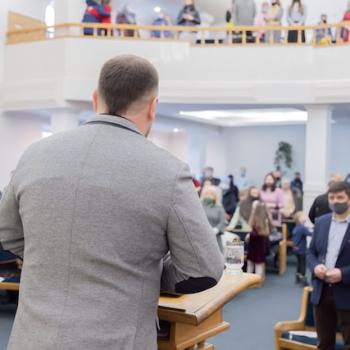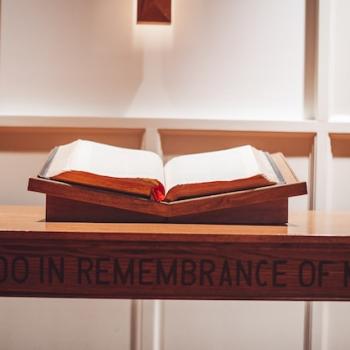Crises of authority can come in many different forms. But most people who seriously reexamine their faith and beliefs encounter some sort of crisis of authority at some point in their journey.
What does spiritual authority look like? What do I want it to look like? Who do I listen to? Who do I believe? How are my views on all of this changing—and is that okay?
This can be difficult territory. When we experience a crisis of authority, it can feel deeply disorienting. Things that once seemed crystal clear become suddenly muddy.
It can feel like a journey through deep, deep mud. Sometimes a lonely journey. Often a very long one.
Diversity of Thought
If you have experienced a crisis of spiritual authority, it might have been sparked by any number of things. For me, at least partly, it was seminary.
The seminary I attended is mildly famous—or infamous?—for encompassing a wide variety of perspectives within the relatively broad umbrella of evangelical-ish Christian faith. People were coming from all sorts of different places theologically.
Lily Aldrin’s words from the TV show How I Met Your Mother come to mind: “It’s my best and most annoying trait.” (She was replying to Ted’s comment: “I hate how you’re always right.”)
My seminary’s diversity of thought—among its students, and particularly among its faculty—often felt like one of its best qualities, and one of its most frustrating.
Authority Figures: Pastors vs Professors
In contrast, I think about the conservative evangelical church I was a part of for eleven years before seminary. At that church, two to four pastors shared preaching responsibilities at any given time. The church valued the chance for the congregation to hear multiple perspectives, multiple voices.
We had no interest in following one larger-than-life leader, cult-style. I loved that.
By the time I got a few quarters into seminary, though, I was starting to realize just how similar my former church’s pastors’ perspectives were.
Sure, they were different (upper-middle-class white male) humans with different (upper-middle-class white male) life experiences. But they had so much basic theological agreement with one another. They had to; otherwise, they would not have been invited by the church’s elder board to serve as a main preaching pastor.
There were some things everyone agreed on. Some things were clear.
My seminary professors, on the other hand, had very little of this agreement. They encompassed theologies as diverse as you can get and still teach at a generally evangelical-identified seminary.
This made learning from them feel, sometimes, quite muddy.
Enlightening, Enriching, Freeing, Confusing, Troubling
Hearing all the vastly different ways my professors thought about faith was, for me, enlightening, enriching, freeing, confusing, and sometimes troubling. Often all at the same time.
- Enlightening, because I had something to learn from them all. Even if sometimes the main insight was Oh, I don’t think that way at all anymore. And I’m okay with that.
- Enriching, because I went to seminary to think more broadly about the Christian faith. My former church had exposed me to one segment of what turned out to be a large, large (historical and present) Christian world. I enjoyed seeing more of this world.
- Freeing, because seeing the different places thoughtful, thoroughly-educated, well-intentioned people landed in their journeys helped me understand that there is not just one destination we’re all trying to get to. There are options. And there is freedom to choose.
- Confusing, because who do you listen to? Of course I did my best to pay attention in class, regardless. But on a deeper, faith-shaping, whole-life-implicated level, who do you listen to? Who do you believe? How do you decide who and what to believe?
- Troubling, because if thoughtful people can come to all these different places, who’s to say who’s right and wrong about anything? Being in a place where everyone believes (or at least professes to believe) roughly the same things can be comforting. Being pushed out of that place can be troubling.
I felt like I was pushed out of a realm of something-resembling-clarity. Pushed into the mud.
A Different Kind of Authority
Really, my seminary professors exercised a different kind of authority than my former pastors.
My seminary professors had authority in the classroom. Authority to ask questions, to expose us to material and perspectives, to help us think about things. They did not have authority to tell us what to believe.
This made seminary, in many ways, good for me—and freeing.
Church pastors often try to help their congregation all be on the same page. They often try to teach people what kinds of views we should take of God, ourselves, other people, and any given issue people want to talk about.
Seminary professors, at their best, make it their goal to help students figure out their own views for themselves.
This makes everything more difficult. It makes everything murky. No one is telling you what to believe. It’s difficult—but it is also good.
When the Training Wheels Come Off
It’s like training wheels on a bike. Every church tradition has their own take on things. And this can provide helpful scaffolding when everything is new. It gives you handholds, a place to hold onto.
But then, at some point, the training wheels come off. And you wobble and struggle and lurch about for a while. But then you learn how to bike, how to really bike. How to soar.
Maybe theology is like this, too. If so, I think this is a good thing.
Crises of faith can provoke much-needed change. Good change. But it doesn’t always feel good at the time. Sometimes it just feels like the rug is pulled out from under you.
We might relate to Julie Rodgers as she reflects on her experience in Outlove: A Queer Christian Survival Story: “Part of me longed to return to the days when decisions were made for me, when truth was entirely knowable and uncomplicated.”
When we experience a crisis of authority, decisions that once seemed easy now feel complex. Truth that once seemed knowable now feels out of reach. Things that once seemed uncomplicated now feel very complicated indeed.
Life in the Mud
Our ideas of authority can fall apart over years or in an instant, and this can feel both liberating and really really awful. Often all at the same time.

There is beauty in the murk, but it is not always obvious, especially at first. It takes some digging to get there.
In the next few weeks we’ll go looking for some of this beauty. What is on the other side of the wobbling and lurching? What might we find in the mud?
Could what seemed hopelessly murky actually be rich soil, where good things can grow? What new perspectives do we gain as we stumble and wander through the mud?
This is not easy. But it can be rewarding.
We might get muddy. But I think it will be worth it.
In this space I’ll be exploring how my own views of authority have changed—in areas ranging from the Bible, to church leaders, to preaching, to the history of the Christian tradition.
If any of this sparks your interest, I hope you hang out here over these next few weeks. The journey may be muddy, but it doesn’t have to be lonely. We can walk together and see what richness we might find.












